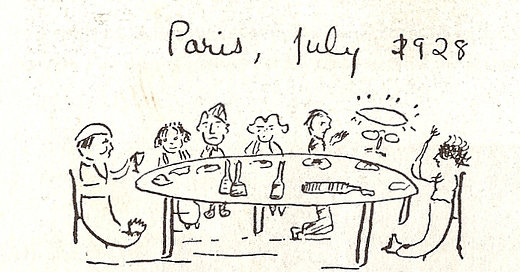“As for Joyce, he treated people invariably as his equals, whether they were writers, children, waiters, princesses, or charladies. What anybody had to say interested him; he told me that he had never met a bore.” — Sylvia Beach, owner and proprietor of Shakespeare & Co. bookstore, publisher of Ulysses
***********
I handed the book to my Dad. We were sitting on the front porch of a house on a lake in New Hampshire, during the vacation we take every year as a family. I was reading Ulysses for the first time, struggling through on my own, without notes or guide. Well, that’s not true. Dad was my guide. When I found myself in the weeds, I’d reach out, and he’d provide course-correction or context.
I did not understand what was happening on the page. The language was easy to grasp, not like the intimidating “Oxen of the Sun” chapter, where it helps if you are fluent in ancient Anglo-Saxon and Middle English. But this … Suddenly, out of nowhere, there was a first-person narrator, who was neither Leopold Bloom nor Stephen Dedalus, and the voice was chatty and voluble and peppered with the phrase “says I”. The mysterious narrator was regaling his listeners (or listener?) with something that happened earlier in the day. What any of this had to do with anything was beyond me. I was frustrated and felt like I could not continue until I knew what Joyce was doing. If you know what he’s DOING, the rest is easy. So I handed the book to Dad.
“I am so confused. What is going ON.”
He glanced at the page and handed the book back to me, “Oh, that’s the Cyclops section.”
Keep reading with a 7-day free trial
Subscribe to The Sheila Variations 2.0 to keep reading this post and get 7 days of free access to the full post archives.



